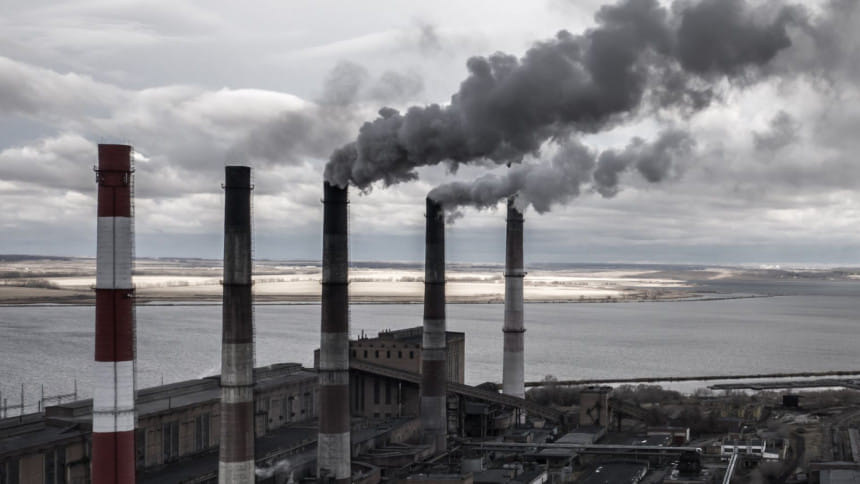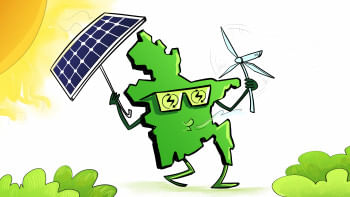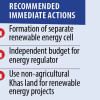The contradiction of comfort

We burn fossil fuel to make our lives easier and more comfortable. Why climb stairs when you can take the lift? Why walk or cycle when you can drive a car or ride a motorcycle? Why prepare food yourself when you can buy everything processed and packaged?
Meanwhile, the year 2023 was the hottest on record. In all likelihood, 2024 will surpass 2023, and so on. Who could have believed that the temperature in Dhaka would reach, nay surpass, 40 degrees Celsius? Forest fires, flooding, potential famine; severe storms; increasing numbers of climate refugees, and more than five million people dying annually from climate extremes: all of these are the result of our addiction to fossil fuels.
Now that we are accustomed to the relative ease given to us by burning fossil fuels, most people dread going back. That's when we come up with ludicrous solutions like electric cars (which are built and charged using electricity that comes from burning fossil fuels) or carbon capture machines (nowhere near a practical reality yet) or colonising another planet (oh, that's realistic!). Meanwhile, the crisis keeps getting worse: hotter weather, worse storms, more damage and devastation.
What happened to the comfort and convenience promised to us by fossil fuels? It's not comfortable roasting in your own skin. Not only is air conditioning not affordable to everyone, but it requires electricity—which still comes mostly from burning fossil fuels. The "solution" worsens the crisis.
And it's not "just" the climate crisis. Think about pollution. How comfortable is it to not have clean air to breathe? How convenient is it to rely on medicine to control your asthma, and occasionally land up in the hospital gasping for breath? Seven million people die each year in the world due to air pollution. Clean air is now the rarity, not the norm. Does breathing filthy air make us more comfortable?
The contradiction is paralleled by our experience of motorised transport. Travelling by car or motorbike is supposed to be more convenient. You (supposedly) reach your destinations faster and more comfortably. The reality is, you're often stuck in traffic, breathing in smoke from all the other motorised vehicles which, like yours, emit fumes while clogging the road. The greater the number of individual motorised vehicles, the worse the situation. As the traffic gets worse (and the climate hotter), fewer people are willing to walk or cycle; more people buy cars; it's a vicious cycle. And again, it's very hard to go back.
Our planet is 4.5 billion years old. Human beings have been on earth for six million years. Human life on earth changed dramatically during industrialisation, starting about 170 years ago. Cars have only been widely used for a century (and, of course, for far less time in Bangladesh, where they remain—despite appearances—the vehicle of only a small minority). The remarkable damage that we have done to this planet in such an incredibly short time is epic.
At the risk of sounding like a broken record, may I gently remind my readers that, despite what some will tell you, another world is possible. The current reality is not the only possibility. For virtually all of human history, we lived in harmony with earthly limits. Sure, there were plenty of discomforts and early mortality; and some of our comforts and conveniences are worth maintaining. I, for one, wouldn't be alive if it weren't for good asthma medication.
But as our weather gets weirder and our storms get worse, and as our governments fail to take serious action to address the ever-worsening climate crisis, it's worth reminding ourselves that we are rapidly approaching—or have already reached—the end of the era of mindlessly burning ever more fuel to gain ever more comfort and convenience. And much as we'd like to believe in shortcuts and magical solutions, it's past time to accept that those shortcuts and solutions haven't panned out and we are out of time.
Fortunately, convenience and comfort come in the form of trade-offs. There is a lot that we could gain—cleaner air, safer streets, and more sociable communities, as well as a more stable climate—if we dramatically reduced our use of fuel and returned to some of the positive traditions that we have, only relatively recently, left behind.
Debra Efroymson is the executive director of Institute of Wellbeing, Bangladesh.
Views expressed in this article are the author's own.
Follow The Daily Star Opinion on Facebook for the latest opinions, commentaries and analyses by experts and professionals. To contribute your article or letter to The Daily Star Opinion, see our guidelines for submission.

 For all latest news, follow The Daily Star's Google News channel.
For all latest news, follow The Daily Star's Google News channel. 












Comments